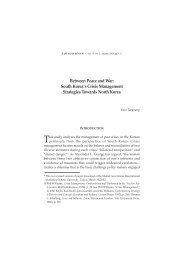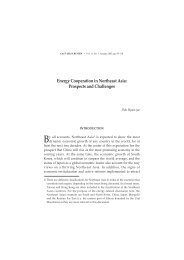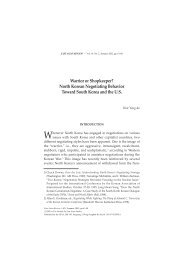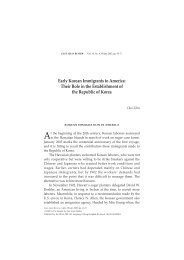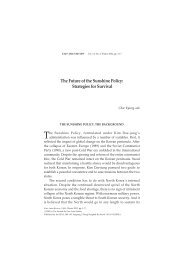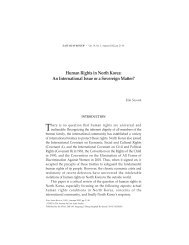Sino-Korean Relations since 1992 - the Institute for East Asian Studies
Sino-Korean Relations since 1992 - the Institute for East Asian Studies
Sino-Korean Relations since 1992 - the Institute for East Asian Studies
You also want an ePaper? Increase the reach of your titles
YUMPU automatically turns print PDFs into web optimized ePapers that Google loves.
12 EAST ASIAN REVIEW SPRING 2002<br />
fundamental issues through <strong>the</strong> dissolution of <strong>the</strong> Cold War<br />
structure on <strong>the</strong> peninsula. The new approach corresponds with<br />
China’s basic understanding of, and policy on <strong>the</strong> <strong>Korean</strong> peninsula.<br />
There<strong>for</strong>e, South Korea and China, based on <strong>the</strong>ir mutual<br />
understanding, should seek a policy that would dismantle <strong>the</strong> Cold<br />
War structure on <strong>the</strong> peninsula through close cooperation.<br />
In this regard, <strong>the</strong> issue of U.S. military presence would likely be<br />
a key issue <strong>for</strong> discussion between South Korea and China. There has<br />
been a certain degree of discrepancy between China’s official<br />
position and its actual policy regarding <strong>the</strong> withdrawal of <strong>the</strong> U.S.<br />
military in South Korea, and its position on <strong>the</strong> issue has varied<br />
depending on changes in <strong>the</strong> leadership and <strong>the</strong> strategic<br />
environment.<br />
Following its basic principle of <strong>for</strong>eign policy that opposes <strong>the</strong><br />
stationing of <strong>for</strong>eign military in a <strong>for</strong>eign country, China has<br />
maintained an official policy consistent with its principles. However,<br />
after <strong>the</strong> 1980s, when China broke away from Mao’s revolutionary<br />
diplomacy and began promoting independent <strong>for</strong>eign policy, it took<br />
a more pragmatic perspective, re-evaluating <strong>the</strong> U.S. military<br />
presence in South Korea. In o<strong>the</strong>r words, China acknowledged <strong>the</strong><br />
U.S. military presence in South Korea as a historical product of <strong>the</strong><br />
Cold War system. It also understood <strong>the</strong> negative impact on <strong>the</strong><br />
balance of power on <strong>the</strong> <strong>Korean</strong> peninsula and Nor<strong>the</strong>ast Asia that<br />
would result if <strong>the</strong> U.S. military withdrew. Hence, China’s actual<br />
policy regarding <strong>the</strong> U.S. military in South Korea seeks gradual,<br />
ra<strong>the</strong>r than complete and abrupt withdrawal of <strong>the</strong> U.S. military, <strong>the</strong><br />
establishment of countermeasures against <strong>the</strong> negative impact of<br />
military withdrawal. If China and <strong>the</strong> U.S. were to cooperate in<br />
issues <strong>for</strong> <strong>the</strong> <strong>Korean</strong> peninsula, China’s pragmatism on <strong>the</strong> U.S.<br />
military in South Korea would likely become more evident.<br />
However, if U.S.-North Korea relations improve in <strong>the</strong> future and<br />
<strong>the</strong> effects of <strong>the</strong> South <strong>Korean</strong> government’s policy to resolve <strong>the</strong><br />
<strong>Korean</strong> peninsula issue through <strong>the</strong> dissolution of <strong>the</strong> Cold War<br />
structure takes shape, <strong>the</strong> need to redefine <strong>the</strong> U.S. military presence



